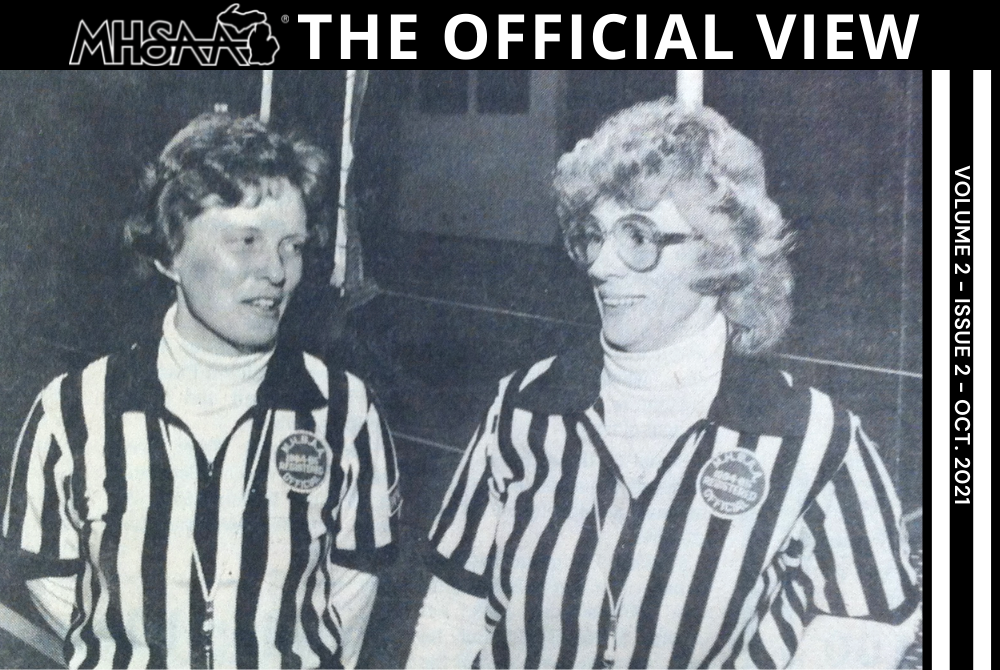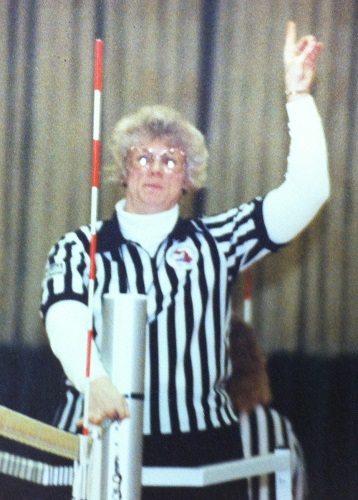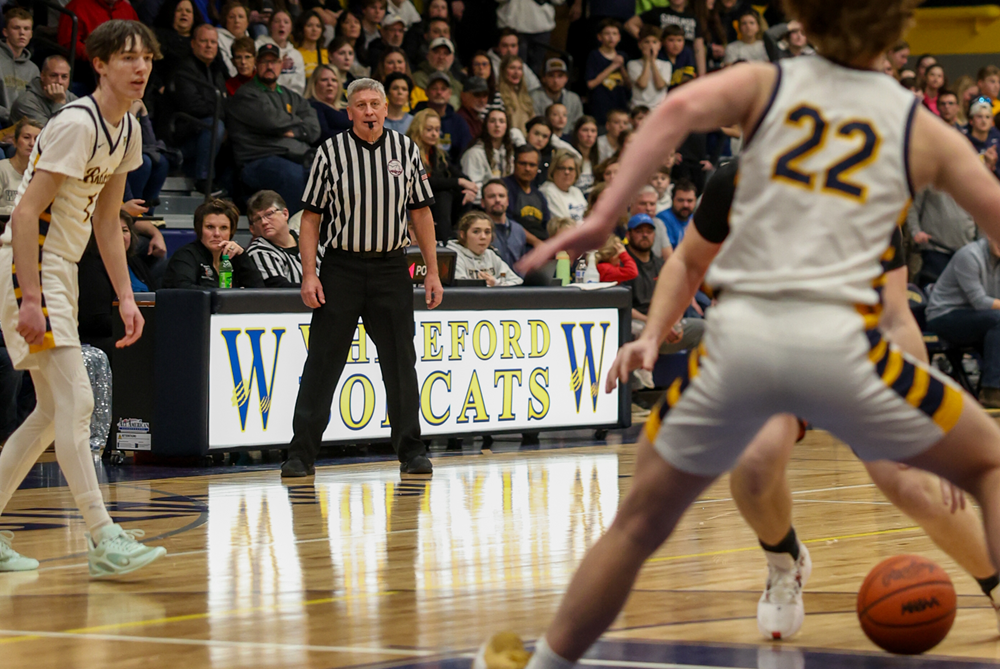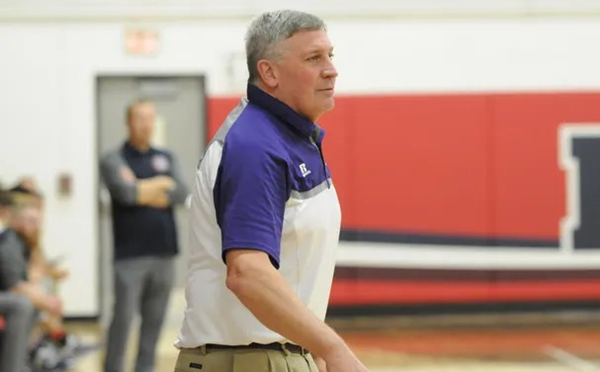
The Official View: Title IX – Door Opens for Female Officials
By
Brent Rice
MHSAA Assistant Director
October 29, 2021
In the 50 years since Congress passed Title IX legislation in order to create equal educational opportunities, huge strides have been made for female students to participate in athletics.
But the advancement of opportunities wasn’t just for the athletes. It also opened a door which ushered in a generation of female sports officials.
Betty Near is one of those officials whose long and distinguished career as a high school and collegiate volleyball official is a direct result of the opportunities provided through Title IX. Unlike many today who entered officiating after having played the sport, Betty didn’t have those opportunities before first climbing the ladder (literally) in 1971. She was encouraged to take up the sport by Macia Tiesenga (a nationally-ranked collegiate official) who told Betty – who had been involved in athletics recreationally – that athletes make the best officials because of their understanding of competition.
“I’m frequently asked whether I got into officiating because I played volleyball. I tell them I didn’t play because girls volleyball didn’t exist when I was in school," Near said. "I try to share the story of Title IX every chance I get, to show them that they now have opportunities to both play and officiate because of those that came before them.”
Near has spent more than 45 years as a registered MHSAA official and is still going strong. That run has included six appearances as a Finals official. She recalls how at one of those Finals, an injury to her knee created a change in mechanics for the entire state.
“When I first began officiating in the 70s, the MHSAA had the umpires (R2s today) kneel underneath the net to look at blockers," she said. "This was quite dangerous and pretty ineffective.
"Officiating at the collegiate level, I had been trained to stand at the pole and look down the net. With this background, and seeing as my knee was still hurting from an earlier injury, I decided to use this mechanic.”
 Sue Martin, the MHSAA director for volleyball at the time, approached Betty following her match. Near was certain that she was going to receive an earful. Instead, Martin asked the justification for using the mechanic, and they discussed the pros and cons of each. It was ultimately decided moving forward the umpire would take a position standing at the pole.
Sue Martin, the MHSAA director for volleyball at the time, approached Betty following her match. Near was certain that she was going to receive an earful. Instead, Martin asked the justification for using the mechanic, and they discussed the pros and cons of each. It was ultimately decided moving forward the umpire would take a position standing at the pole.
Mechanics changes aren’t the only effect Near has had on the sport. She was instrumental in the start of the West Michigan Volleyball Officials Association in 1984 and continues to help lead and grow that organization (now with more than 125 members). This has allowed her to work with the community, raising nearly $125,000 for scholarships for graduating high school seniors. And one of her biggest contributions remains her role in recruiting and mentoring new officials – especially helping to develop the next generation of female officials.
“Mentoring is a gratifying thing,” said Near, “especially when I receive emails or calls thanking me for helping them understand specific rules or situations and improving their skill sets. Watching someone I have mentored over 20 years work her way up to officiate multiple state tournaments (pleases me).”
Now officiating primarily at the college level, Betty still reserves Thursdays during the season to officiate MHSAA contests. She does this for the purpose of staying connected to high school students and officials and to build on the growth of female registered officials, though she also recognizes that challenges remain for female officials advancing through the system.
One of the natural barriers that apply to women more often than men is that women who begin families sometimes find difficulties continuing to officiate with their other responsibilities. While home lives can be difficult to navigate (for both women and men), officiating school sports provides a flexible alternative to stay active, remain involved in athletics, give back to the community, develop camaraderie and earn some extra cash.
Another hurdle that Near identifies for female officials, unfortunately, is a continuation of the “good ol' boy network.” She is reminded of a not-so-distant-past example when she and another female official had been selected to officiate the Regional round of the MHSAA Tournament; and even though both were well-established collegiate officials the host athletic director insisted that less-experienced male officials work as the R1 and R2 and the women work as line judges because the men would have better control of the tough matchup.
Of course, that kind of mindset isn’t based in fact, and many of the MHSAA’s best officials in all sports are women. Especially in girls sports, it is important that the student athletes see officials who represent them; but the MHSAA seeks female officials in all sports, including those dominated by male participants. This year will once again include a female officiating in the MHSAA Football Finals. Female officials also have worked Finals in baseball, boys basketball, ice hockey and wrestling.
The door that was opened for women and girls with the passing of Title IX a half-century ago only provides the opportunity. Capitalizing still requires stepping through the door to take full advantage of the opportunities provided. Near wants to encourage anyone to join the avocation of officiating, but especially young women.
“My hook is that the officiating is fun, and it is an activity that can be an avocation that can pay (in many ways) throughout their lifetimes," she said.
It’s Official!
Postseason Assignments: Officials assignments for fall sports tournaments have been released. Congratulations to all selected to officiate this year.
Speaking of tournament assignments, a change will be made this year that allows basketball officials to submit their availability to work together as a crew. Crews can be set for the boys and girls tournaments separately. The hope is that this will encourage more officials to seek postseason consideration, knowing they can choose with whom they will officiate. Eligible individuals not included with a crew will be assigned a crew by MHSAA staff.
For all winter sports officials, make sure to complete all requirements for postseason consideration. Please remember that officials in basketball, competitive cheer, gymnastics, ice hockey and wrestling must opt-in to the tournament by indicating their tournament availability dates HERE. All additional requirements such as completion of tournament exams and submission of regular-season schedule also remain in place.
Officials Review Committee: The Officials Review Committee, consisting of school administrators, officials and assigners from around the state, convened in early October to discuss issues and concerns involving officiating. A number of proposals were made to the MHSAA Representative Council. You can find these and other discussion items by reviewing the minutes HERE.
Know Your Rules
SOCCER A player (#7) is injured and must leave the field. His team elects to play short-handed. If #7 heals up, when can he return to the field? What if they wish to replace him with #12?
RULING If #7 comes back into the game, he only needs to wait until the next stoppage of play. If he will be replaced by #12 though, #12 can enter the game only at the next legal substitution opportunity.
It’s Your Call
REVIEW Last month’s play involved a suspect block by a defensive player (found here). The block by B17 is correctly flagged for an illegal block below the waist. While not widely known by spectators, blocks below the waist (except for linemen immediately at the snap) are illegal for players on both sides of the ball. In this case, since the block was by the defense, the penalty is enforced 15 yards from the end of the run.
VOLLEYBALL Officiating ball handling is the topic of this month’s "It’s Your Call." This rally ends following the pass of a back-row player. What’s the call?

Sullivan Returns to Court After Coaching, Sees Game In New Ways as Official
By
Doug Donnelly
Special for MHSAA.com
February 6, 2024
Gary Sullivan is getting a whole new perspective on basketball.
 After 25 years of coaching the game on several levels – including the last six as the boys varsity coach at Blissfield Community Schools – Sullivan has replaced his school logo with stripes and a whistle. He’s enjoying his second basketball career, this time as a referee.
After 25 years of coaching the game on several levels – including the last six as the boys varsity coach at Blissfield Community Schools – Sullivan has replaced his school logo with stripes and a whistle. He’s enjoying his second basketball career, this time as a referee.
“I’m having a good time,” said Sullivan, who will retire this month as a teacher at Blissfield. “I’ve had fantastic experiences so far. I hope it stays that way.”
Sullivan is an Ohio native, having grown up just across the state line and attended Evergreen High School. After graduating from the University of Toledo, he landed a teaching job at Blissfield. Early on, he took a stab at officiating basketball.
“(Former Blissfield baseball coach) Larry Tuttle got me into it,” he said. “I did a few middle school and some junior varsity games. Then, when I became an athletic director pretty early in my career, I gave officiating up.”
He started coaching along the way, from youth sports to middle school basketball. He took over as the Blissfield varsity coach in 2016-17
After winning seven games over two seasons with an experienced roster, Blissfield rebounded with 12 wins in 2018-19 and 19 in 2019-20 – the most for Blissfield since 1992.
The Royals won Lenawee County Athletic Association and Division 2 District titles in 2021. The LCAA title was the first for the Royals since 2003, and the District championship was the first for the school since 2004. He won 60 games in all and earned two county Coach of the Year awards.
He stepped down as basketball coach two years ago.
It wasn’t long and he was being courted to help tackle the referee shortage in Michigan and across the country. His brother, Terry, is a basketball official in the Jackson area.
“When I was finished coaching, I started thinking about it again,” Sullivan said. “My brother does a ton of officiating in the Jackson area. He told me, ‘Just do it. It will be fun. What else are you going to do in the middle of the winter? You might as well referee.’ It gives you a chance to still be involved in the game.”
Initially, Sullivan figured he’d officiate a few middle school and junior varsity games. Once he got his feet wet and adjusted to life with the whistle, however, he was hooked.
 “Last year was my first year – that was my intention, do middle school and some JV, maybe a couple of days a week,” he said. “Before I knew it, they were assigning me games left and right. The more I did it, the more I liked it. By the end of the year, they had the chance to assign a couple of varsity games. No one complained too awful bad, and they gave me a few more.”
“Last year was my first year – that was my intention, do middle school and some JV, maybe a couple of days a week,” he said. “Before I knew it, they were assigning me games left and right. The more I did it, the more I liked it. By the end of the year, they had the chance to assign a couple of varsity games. No one complained too awful bad, and they gave me a few more.”
With his basketball background, Sullivan found being a referee an outlet for his competitive nature.
“Being around basketball has made it much easier for me than someone who just comes in and, ‘Hey, I’ll try to do this,’ he said. “You are competing with yourself a little to make the right call and keep the game flowing along.”
There have been a few unexpected moments in the transition from coach to referee.
For one, Sullivan said, being on the court is a completely different perspective than being on the sidelines.
“It is so much faster when you have to run and follow that person than it is when you sit there and watch it,” Sullivan said. “When you have to run, get to your primary spot, then keep the peripheral vision going to watch everything, it's much faster, more difficult than I ever anticipated.”
Sullivan said certain aspects of the game are different, too.
“As a coach, I always anticipated what I thought was going to happen,” he said. “In your mind you know someone is going to travel, then as soon as they travel, you are yelling ‘Travel!’ As an official, it is better to be a second late and be correct than a second early and be wrong.
“To me, the toughest transition has been to slow down, wait for the actual play to let itself run its course. Make sure it really was a foul. Think about it. Don’t get in a rush to make the call.”
He’s grateful to other area officials who have helped him learn the tricks of the trade during either formal training sessions or by example. He’s had the chance to review some of his games on film, which has helped him dissect the game from a new angle. He’s also learned from coaching to block out fans and people from the crowd who might disagree with a call.
“I have not had a negative experience yet from a fan,” he said. “As a former coach, I put myself on double probation – I dished out enough that maybe I’m a little more tolerant than some other officials. That’s just my personality at this point.”
This year Sullivan has had a full schedule of middle school games plus about a dozen girls varsity basketball games and a handful of boys varsity games. The most recent was Friday in Ottawa Lake in front of a big crowd watching rivals Whiteford and Summerfield.
“That was a ton of fun – full house, competitive game. I was glad to be a part of it,” Sullivan said.
There’s another bonus to being an official. When the game is over, he can go home and sleep. No more late nights watching film or scouting for the upcoming opponent.
“My cats are much happier,” he said. “I’m not waking up at 4:30 in the morning and watching a film, then going back to bed. It’s fun. I’m enjoying it.”
 Doug Donnelly has served as a sports and news reporter and city editor over 25 years, writing for the Daily Chief-Union in Upper Sandusky, Ohio from 1992-1995, the Monroe Evening News from 1995-2012 and the Adrian Daily Telegram since 2013. He's also written a book on high school basketball in Monroe County and compiles record books for various schools in southeast Michigan. E-mail him at [email protected] with story ideas for Jackson, Washtenaw, Hillsdale, Lenawee and Monroe counties.
Doug Donnelly has served as a sports and news reporter and city editor over 25 years, writing for the Daily Chief-Union in Upper Sandusky, Ohio from 1992-1995, the Monroe Evening News from 1995-2012 and the Adrian Daily Telegram since 2013. He's also written a book on high school basketball in Monroe County and compiles record books for various schools in southeast Michigan. E-mail him at [email protected] with story ideas for Jackson, Washtenaw, Hillsdale, Lenawee and Monroe counties.
PHOTOS (Top) Official Gary Sullivan monitors the action while working a boys basketball game at Ottawa Lake Whiteford. (Middle) Sullivan directs his team from the sideline during his tenure as Blissfield’s boys basketball coach. (Top photo by Mike Doughty; middle photo courtesy of the Adrian Daily Telegram.)

